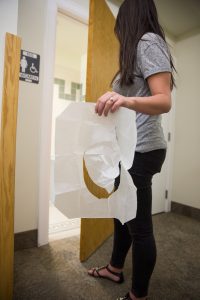
BYU’s campus does not supply toilet seat liners in bathroom stalls. This lack of toilet seat liners is actually more sanitary than having them, according to Keith Willmore, MD.
While the reason BYU does not have toilet seat liners is not definitive, public health, custodial, budgetary and environmental concerns are all contributing factors.
According to public health major Kristine MaWhinney, toilet seat liners are a standard in other public places, but she is unsure whether they are really helpful when it comes to public health.
“They’re definitely a standard and most public places have them,” MaWhinney said. “I was surprised that BYU didn’t have them — I mean, especially just as an option for people.”
Public health major Ryan Tolman believes having toilet seat liners would encourage other sanitary practices and people use toilet seat liners when they see them.
“I think it would be beneficial,” Tolman said. “I think that it would stimulate other positive and other healthy behavior. Putting a seat cover down would also be that visual cue that you want to wash your hands more and do other things like that.”
Having paper toilet seat liners may provide students with peace of mind when they use the restroom, according to MaWhinney.
“I think it at least gives people security, even if it’s not as helpful as cleaning them,” MaWhinney said. “At least people feel more safe, so that would be nice.”
Toilet seats are generally considered to be gross and germ-infested, but they shouldn’t be feared, according to Everyday Health.
“Research has been done, and this was a while ago, and they found that the tissue paper, even the kind that has the wax coating on it, actually tends to absorb any bacteria that’s sitting on the toilet seat, and it’s more likely to transfer to the skin than if you’re just sitting on the plain toilet seat.”” Willmore said.
Willmore said skin keeps most bacteria out unless something is wrong, and infections are spread from hands by touching the face.
“The ironic thing is if you’re actually touching the toilet seat with your fingers to cover it up, you’re much more likely to get an infection because most infections are gotten by touching something and then touching the face,” Willmore said. “Almost all infections —that’s how they’re transmitted.”
Christy Burnett is the building coordinator over May and Hinckley Halls at Helaman Halls. She said each building on campus may vary in how often restrooms are cleaned and what cleaning products are used, but the dorm bathrooms are checked twice a day.
“We use extremely strong chemicals to clean our toilets down here at housing and I know they use the same ones up at the Wilkinson Center and so I don’t know if it’s because of our chemicals that they feel like that is a reason why we don’t need (toilet seat covers),” Burnett said.
Ole Smith, Assistant Administrative Vice President of Physical Facilities, declined to comment on why toilet seat liners are not available on campus.
Some students don’t care whether BYU has toilet seat covers. Political science student Haley Roberts said she would rather BYU focus on things such as recycling. She said people are wasteful and having toilet seat liners would add to that waste.
Roberts even joked about having one-ply toilet paper.
Willmore said having toilet seat liners may help psychologically, but he recommends not using them.
“If somebody really wanted to do something that would make a difference, then probably the thing to do would be to carry around some of those Clorox wipes or alcohol wipes and that actually would make a difference,” Willmore said.




